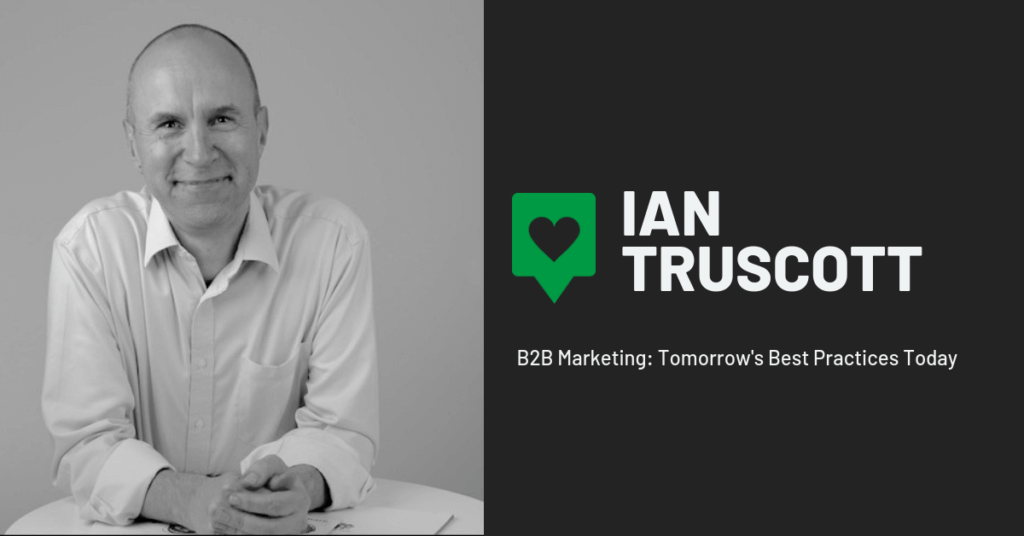In B2B Marketing: Tomorrow’s Best Practices Today, we feature expert interviews about the state of B2B Marketing and what the future holds. In this post, I interview Ian Truscott, founder of marketing agency Appropingo.
Tell us about yourself?
I’ve recently founded a marketing agency (Appropingo), we specialize in established B2B software companies and start-ups, focusing on strategic advisory, content marketing, influencer marketing and fractional CMO leadership for companies not quite ready for a full-time CMO. I’m also the editor-in-chief of Rockstar CMO.
Note: Follow Ian on Twitter (@IanTruscott).
Tell us about your background in B2B marketing?
I’ve spent practically my whole life either taking B2B software products to market or working in their ecosystem as an analyst, consultant and agency dude. I started as a techie before moving to the dark side, first in product marketing, then I’ve led content marketing teams and of course, as a CMO.
What’s a best practice that B2B marketers should move on from?

Oh gosh, we run a regular feature on Rockstar CMO of the things the CMO’s we interview would like to throw in our special place in hell that we call the Rockstar CMO Swimming Pool, it’s quite an entertaining list!
Some marketers have lost their way, made life way too complicated with all the faddy best practices, channels, etc. becoming dependent on big budgets, their agencies and tech, and now spend their lives as project managers on a hamster wheel of execution, occasionally distracted and disrupting themselves and their teams as they try to be on the next wave of new stuff.
Instead of being focused on our primary objective to deliver value, a return in investment — to create awareness, revenue and trust.
Oh and if I can have another one: we have to stop putting bullshit words in front of the word marketing (my pet peeve is ‘agile’) and just deliver value and growth.
Tell us a best practice of tomorrow that B2B marketers should be doing today?
The echo chamber around marketing would have you believe that organizations have nailed it, things like personalization or omnichannel communication, that as an industry we’ve talked about for years are here and now and we need to turn our attention to what’s next.
But, I’m fortunate in getting to hang out with real marketers and they talk about some fundamental challenges in their organizations that need to be tackled first, before they move onto what you could argue Peppers & Rogers described in the mid-nineties as One to One marketing.
They require significant transformation, a maturity in things like content management, customer insight, a coherent approach to metrics — these things are their tomorrow. Yeah, maybe 1996 is their tomorrow.
I’ve digressed!
Back to your question of what B2B marketers should be doing today. Like a true consultant, I say it depends.
One thing for sure, deliver value.
I think we need to worry less about the best practice of tomorrow and strip down what we are doing today, to focus on our objectives, the needs of our audience and make hard choices about which strategies, tools, tactics and exciting new technical doohickey is really going to deliver against them.
You were once a software industry analyst. What’s one thing vendors could be doing better with their analyst relations?
I was! That was a while ago.
The tough thing I found, certainly in the category I was covering, was that vendors wanted to focus on their point of view about the market and demonstrate a vision, rather than how they were different.
The cruel truth was that their 50 slides on the personalized, relevant, omnichannel future was not so different from their competitors and probably the same as the point of view of the analyst (side note: do your research).
It’s so easy to be in the vendor bunker believing you know the market, but in an established software category the truth is that the guy or gal in the next-door bunker is thinking the same.
You know who knows the market? Uh huh. The analyst, so why bore them for an hour?
On analyst relations: “…vendors wanted to focus on their point of view about the market and demonstrate a vision, rather than how they were different.”
Those 50 slides were not the sizzle on the sausage they thought it was, they were table stakes, maybe appropriate if we were hiring analysts, but we were looking for why we would recommend a product to a client.
We needed to encourage vendors to show us how they were different – golly, some had to be instructed to do a demo!
So, yes, by all means vendors need to demonstrate that they are relevant to the current zeitgeist or the change in the world, but that has to be 30% max of the briefing, the rest needs to focus on credibility, differentiation and the product.
Aside from product recommendations for a client, as an analyst you are also looking for proof points in a line of research.
We don’t need someone else that agrees with the theory, we want to see a client case study that supports that a change is happening, or that their latest research has real world relevance, that there are quotes, stats or references that they could use. A vendor may have something that the analyst wants.
You help B2B companies create ART (Awareness, Revenue & Trust). Tell us more?
Note: First read Ian’s post, “The ART of B2B Marketing.”

At censhare, my last full time CMO gig, ART gave us the mission and focus.
Working with my CEO, I committed to metrics that were focused around those three objectives (e.g., awareness, revenue, trust), linked to budget. These simple metrics then gave marketing relevance to the objectives of the board: investment and growth.
They also gave us a structure for push-back.
One of the challenges for marketing is that it’s not like being a doctor or an airline pilot, everyone pretty much thinks they know about marketing. (Oh, please don’t suggest we should advertise at the airport).
As a team, we then applied them as a test to everything that came our way. If something could not measurably create ART, we did not do it.
“I truly believe focus is the secret sauce for successful marketers.”
Or at least we could have a constructive conversation — and if the CEO really wanted to take all our clients and partners to Oktoberfest, then PROST! But it was clear what impact this would have on the ROI of our budget.
As a result, we could focus, and we smashed our metrics. Whether ART is your thing or not, it’s so easy in marketing to be blown off course.
I truly believe focus is the secret sauce for successful marketers.
What did the advertising industry teach you that you apply to your B2B marketing?
My time with McCann gave me a taste of B2C, which was fun, but primarily, being agency side taught me to be a better client, to understand the game.
On the one hand, I now have a very low tolerance for the tax of account managers, project managers, client principals or whatever else big agency wants to heap on, that gets between you and the talent.
On the other hand, I understand what excites an agency: it’s interesting work, a fair margin, clear briefs and direction. A great partnership needs to mutually beneficial.
So much of the profit on an account can be swallowed by a client that doesn’t know what they really want. You need to do your homework before you talk to the agency: what do you want, what are your priorities, what results do you expect, what is your budget – and speak plainly about that.
Oh and one final thing, my current roster of favourite agencies are folks that popped out of McCann and did their own thing. It gave me a great network.
Is there anything I haven’t asked you that you’d like to tell us about B2B marketing?
B2B is not “Be 2 Boring,” it’s business to people.
“Nobody cares about your product, they care about their problem.”
You need to express who you are and focus on how you are different. Be prepared that people won’t like you (because the people that will, really will) and stop trying to look like the me-too, faceless, “leading” vendor from some beige office building on the I-95 outside Boston.
The buyer is looking for “different.”
Oh and finally, your bloody website — nobody cares about your product, they care about their problem.

0 Comments on "B2B Marketing Q&A: Ian Truscott on Analyst Relations, Creating ART, Being Different and More"